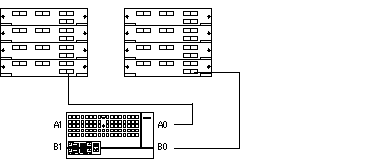How to Add the First StorEdge A5x00 Array to a Running Cluster
Use this procedure to install a StorEdge A5x00 array in a running cluster that does not yet have an existing StorEdge A5x00 installed.
If you are installing a StorEdge A5x00 array in a running cluster that already has StorEdge A5x00 arrays installed and configured, use the procedure in "How to Add a StorEdge A5x00 Array to a Running Cluster That Has Existing StorEdge A5x00 Arrays".
Perform the steps in this procedure in conjunction with the procedures in the Sun Cluster 3.0 12/01 System Administration Guide and your server hardware manual.
-
Determine if the StorEdge A5x00 array packages need to be installed on the nodes to which you are connecting the StorEdge A5x00 array. This product requires the following packages.
# pkginfo | egrep Wlux system SUNWluxd Sun Enterprise Network Array sf Device Driver system SUNWluxdx Sun Enterprise Network Array sf Device Driver (64-bit) system SUNWluxl Sun Enterprise Network Array socal Device Driver system SUNWluxlx Sun Enterprise Network Array socal Device Driver (64-bit) system SUNWluxop Sun Enterprise Network Array firmware and utilities
-
On each node, install any necessary packages for the Solaris operating environment.
The StorEdge A5x00 array packages are located in the Product directory of the CD-ROM. Use the pkgadd command to add any necessary packages.
# pkgadd -d path_to_Solaris/Product Pkg1 Pkg2 Pkg3 ... PkgN
- path_to_Solaris
-
Path to the Solaris operating environment
- Pkg1 Pkg2
-
The packages to be added
-
Shut down and power off any node that is connected to the StorEdge A5x00 array.
# scswitch -S -h nodename # shutdown -y -g0 -i0
For more information on shutdown procedures, see the Sun Cluster 3.0 12/01 System Administration Guide.
-
Install host adapters in the node that is to be connected to the StorEdge A5x00 array.
For the procedure on installing host adapters, see the documentation that shipped with your network adapters and nodes.
-
Cable, configure, and power on the StorEdge A5x00 array.
For more information, see the Sun StorEdge A5000 Installation and Service Manual and the Sun StorEdge A5000 Configuration Guide.
Figure 6-2 shows a sample StorEdge A5x00 array configuration.
Note -Cabling procedures are different if you are adding StorEdge A5200 arrays in a SAN by using two Sun StorEdge Network FC Switch-8 or Switch-16 switches and Sun SAN Version 3.0 release software. (StorEdge A5000 and A5100 arrays are not supported by the Sun SAN 3.0 release at this time.) See "StorEdge A5200 Array SAN Considerations" for more information.
Figure 6-2 Sample StorEdge A5x00 Array Configuration

-
Power on and boot the node.
# boot -r
For the procedures on powering on and booting a node, see the Sun Cluster 3.0 12/01 System Administration Guide.
-
Determine if any patches need to be installed on the node(s) that are to be connected to the StorEdge A5x00 array.
For a list of patches specific to Sun Cluster, see the Sun Cluster 3.0 12/01 Release Notes.
-
Obtain and install any necessary patches on the nodes that are to be connected to the StorEdge A5x00 array.
For procedures on applying patches, see the Sun Cluster 3.0 12/01 System Administration Guide.
Note -Read any README files that accompany the patches before you begin this installation. Some patches must be installed in a specific order.
-
If required by the patch README instructions, shut down and reboot the node.
# scswitch -S -h nodename # shutdown -y -g0 -i6
For more information on shutdown procedures, see the Sun Cluster 3.0 12/01 System Administration Guide.
-
Perform Step 3 through Step 9 for each node that is attached to the StorEdge A5x00 array.
-
Perform volume management administration to add the disk drives in the StorEdge A5x00 array to the volume management configuration.
For more information, see your Solstice DiskSuite or VERITAS Volume Manager documentation.
- © 2010, Oracle Corporation and/or its affiliates
